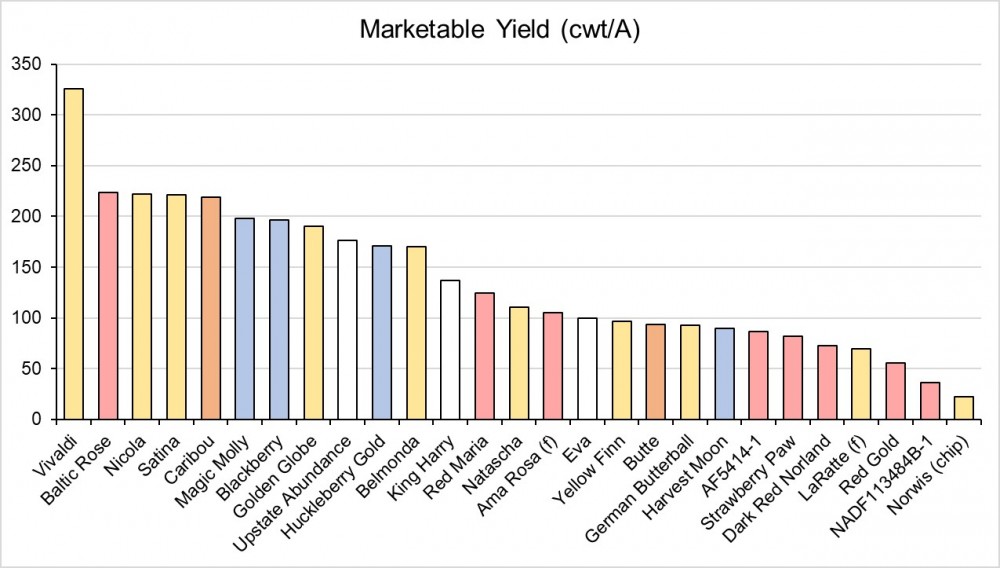Small-Scale Fresh Market Potato Variety Trial Results
Margie Lund, Extension Vegetable Specialist
Cornell Vegetable Program
This year, the Cornell Vegetable Program planted a potato variety trial focused on commercially available fresh market potato varieties, with the small-scale potato grower in mind. This trial allowed us to test different varieties of potatoes that might be of interest to consumers at farm markets and see how well they perform in a western NY climate. In this overview, we share overall yield results from the trial as well as some details on some stand out varieties.
 Marketable yield of all varieties in this year's small-scale fresh market potato variety trial. Varieties are color coded according to skin color (yellow, red, white, purple, and russet). Vivaldi highly outyielded all other varieties, and Norwis performed the worst in the trial.
Marketable yield of all varieties in this year's small-scale fresh market potato variety trial. Varieties are color coded according to skin color (yellow, red, white, purple, and russet). Vivaldi highly outyielded all other varieties, and Norwis performed the worst in the trial.- Vivaldi (yellow skin, yellow flesh) was a standout variety in the trial and the highest yielding yellow skin variety. In our trial, Vivaldi showed some netting and scab, but otherwise performed well.
- Baltic Rose (red skin, yellow flesh) was the standout of the red skinned varieties and second highest performer in the trial overall. This variety showed some scab as well as color variation among tubers and skinning, but overall tubers were a nice size.
- Among the white skinned varieties, Upstate Abundance (white skin, white flesh) performed the best with tubers looking very nice with smooth skins.
- In the purple skinned varieties Magic Molly and Blackberry (both varieties purple skin, purple flesh) were neck and neck. Magic Molly produced nice oblong tubers and Blackberry produced deep purple round tubers, both with some scab and skinning present.
- Lastly, we grew two russet varieties in this trial, with Caribou yielding the highest. However, due to our hot summer we did see a large amount of internal browning in this variety.
If you would like the full report (PDF with photos and yield data) emailed to you, email Margie Lund.

Upcoming Events
African Eggplant Participatory Breeding Kick-Off
March 5, 2026
Join us to learn about the Cornell African Eggplant Research Project and learn how you can participate! African eggplant, also known as Bitterball, Garden Egg, Kittley and other names, is an important crop for many members of our community with heritage from regions such as sub-Saharan Africa, Southeast Asia, and Brazil. Since 2024, the Cornell African Eggplant Research Project has been collaborating with growers and community partners across New York to develop high-quality varieties adapted to the Northeast U.S. In this meeting, we will share information about growing and preparing African eggplant, highlight our research to date, and invite partners to collaborate with us in our 2026 participatory breeding and variety selection efforts.
COST: FREE! You must pre-register to receive the Zoom link.
Managing the Invasive Swede Midge Webinar
March 6, 2026
Swede midge is an invasive fly that causes serious economic losses to brassica crops. Due to its small size and hidden feeding habits, swede midge is often called an "invisible pest" and damage may be misdiagnosed. In this webinar, we will review the swede midge life cycle and crop damage symptoms, current management recommendations, new research findings, and highlights from on-farm case studies with a focus on organic management.
1.75 DEC pesticide recertification credits in categories 1a, 10, and 23.
Good Agricultural Practices (GAPs) Food Safety Training
March 10, 2026
Newark, NY
Learn about food safety on the farm! This event hosted by the Cornell Vegetable Program, Cornell Lake Ontario Fruit Team, CCE Wayne County, and the NYS Department of Agriculture, will cover good agricultural practices (GAPs) to help reduce the risk of microbial contamination on the farm, keeping food and consumers safe.


































